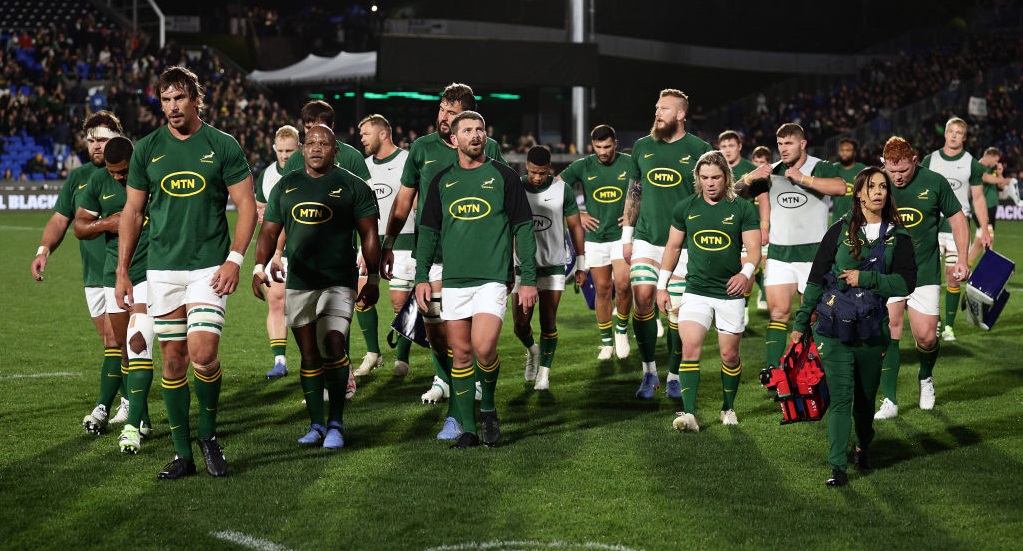Four talking points as Scotland play Springboks in soaring temperatures

Scotland kick off their Rugby World Cup campaign against South Africa in Marseille on Sunday.
Here, the PA news agency sets the scene with five talking points ahead of the mouth-watering Pool B showdown at Stade Velodrome.
Box-office starter to top-heavy group
Beyond the opening game between France and New Zealand on Friday, the Scots’ showdown with the Springboks is the most eye-catching of the first round of pool fixtures. Indeed, Sunday’s match in Marseille is for higher stakes than the opening game in Paris given the strength of Pool B and the reduced margin for error.
The fact the draw was made back in 2020, when several teams were in notably different shape to what they are now, has led to a situation whereby three of the current top five in the world are in the same group. One of South Africa, Ireland or Scotland is guaranteed to be eliminated at the group stage.
Each of the head-to-heads between those three teams are sure to be crucial in deciding who qualifies, assuming they all make light work of both Tonga and Romania. Victory for either team at Stade Velodrome will stand them in good stead to progress from this heavyweight section.
Both teams in buoyant mood
The two sides kick off the World Cup with every right to be optimistic about their chances.
South Africa have climbed from fourth to second in the world rankings in the weeks leading up to the tournament on the back of four consecutive wins. Their emphatic destructions of Wales and New Zealand last month were particularly impressive, ensuring they begin their defence of the Webb Ellis Cup as one of the favourites.
Scotland go into the tournament with words of lofty praise from John Jeffrey ringing in their ears after the 1990 Grand Slam hero branded them the best Scottish team ever at their World Cup welcome ceremony in Nice on Monday.
The Scots are ranked fifth in the world and have arrived in France with a genuine belief that they can beat any team in the world. One of these sides is set to have their bubble burst on weekend one.
Scots must defy history and break new ground
Scotland have never previously defeated a tier-one nation at a Rugby World Cup. In addition, they have lost each of their last seven meetings with South Africa.
It is 13 years since the Scots last beat the Springboks as Dan Parks kicked every point for Andy Robinson’s team in a 21-17 victory in an autumn Test at Murrayfield in November 2010. The last clash between these two nations was almost two years ago, when South Africa won 30-15 in Edinburgh.
The Scots have beaten the Springboks only five times in 28 attempts over more than a century, but Gregor Townsend’s side have ended long winless streaks in recent years, most notably away to France and England.
Style war – power v panache
Along with France and New Zealand, Scotland have become one of the most swashbuckling attacking teams on the planet, while South Africa are the most powerful.
The brutish Springboks will attempt to bulldoze their opponents out of their rhythm, while the Scots – with the on-form Finn Russell pulling the strings at stand-off – are intent on outrunning and outplaying the formidable world champions. It promises to be an intriguing clash of styles.
Can Scots handle the heat?
With France sizzling amid a late-summer heatwave, both sides have had to contend with scorching temperatures throughout their first week at their respective bases on the Cote d’Azur, with the Scots in Nice and the Springboks along the sunkissed coast at Toulon.
The two teams will now come together in the melting pot of Marseille, where it is expected to be in the mid-20s come kick-off at 5.45pm local time.
Scotland will hope the two previous stints they spent in Nice earlier this summer will stand them in good stead, although coach John Dalziel said earlier this week that it feels hotter now, in early September, than it did when they were here previously in June and August.
A French journalist in the media room in Marseille commented on Friday that “it is too hot to play rugby”, although the implementation of water breaks is sure to be welcomed by all involved.
The Scots’ fitness – something they have prided themselves on this summer – is sure to be tested to the limit.












































Nah, we're not thin skinned Alan and you are welcome to have an opinion, but my money is on the Boks for a win 🙂
Unfortunately, the water breaks will suit the boks and their usual tactics of slowing games down to give their bigger lads a breather. Scotland want a high tempo game with few breaks to try and tire the boks out. Our best hope is not to have a destructive 5-20min that we normally seem to have in games as doubt we can come back from 14+pts behind.